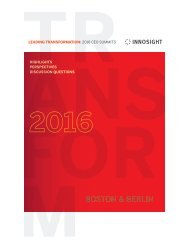TECHNOLOGY AT WORK
1Oclobi
1Oclobi
Create successful ePaper yourself
Turn your PDF publications into a flip-book with our unique Google optimized e-Paper software.
62<br />
Citi GPS: Global Perspectives & Solutions February 2015<br />
Figure 49. Employment share at risk by country<br />
Country<br />
Frey &<br />
Osborne<br />
(2013)<br />
702<br />
occupations<br />
Bruegel<br />
(2014)<br />
Study (Level of detail)<br />
ETLA<br />
(2014)<br />
Frey &<br />
Osborne;<br />
Deloitte (2014)<br />
SSF<br />
(2014)<br />
Unionen<br />
(2014)<br />
22<br />
occupations<br />
410<br />
occupations<br />
369<br />
occupations<br />
109<br />
occupations<br />
Austria 54%<br />
Belgium 50%<br />
Bulgaria 57%<br />
Croatia 58%<br />
Czech Republic 54%<br />
Denmark 50%<br />
Estonia 54%<br />
Finland 51% 36%<br />
France 50%<br />
Germany 51%<br />
Greece 56%<br />
Hungary 55%<br />
Ireland 49%<br />
Italy 56%<br />
Latvia 51%<br />
Lithuania 52%<br />
Luxembourg 50%<br />
Malta 51%<br />
Netherlands 49%<br />
Poland 56%<br />
Portugal 59%<br />
Romania 62%<br />
Slovenia 53%<br />
Slovakia 55%<br />
Spain 55%<br />
Sweden 47% 53% 37%<br />
United Kingdom 47% 35%<br />
United States 47%<br />
Source: The Oxford Martin School<br />
353<br />
occupations<br />
While there are a number of measurement problems associated with comparing<br />
countries according to their susceptibility to automation, it is clear that differences<br />
across countries and regions exist. The Bruegel study, for example, finds a strong<br />
negative relationship between a country’s GDP per capita and the share of their<br />
workforce at risk of automation, suggesting that countries transition into jobs that<br />
are less susceptible to automation along the development path. In particular,<br />
developing countries are likely to find a larger share of their jobs at risk, as lower<br />
wages keep many jobs that are possible to automate from being displaced.<br />
However, as incomes rise and technological progress makes labour substitution<br />
cheaper, even these countries will eventually have to adapt. The challenge ahead<br />
for any country is managing this transition at a sufficient pace for workers to find<br />
new employment opportunities as existing jobs are being automated.<br />
© 2015 Citigroup










